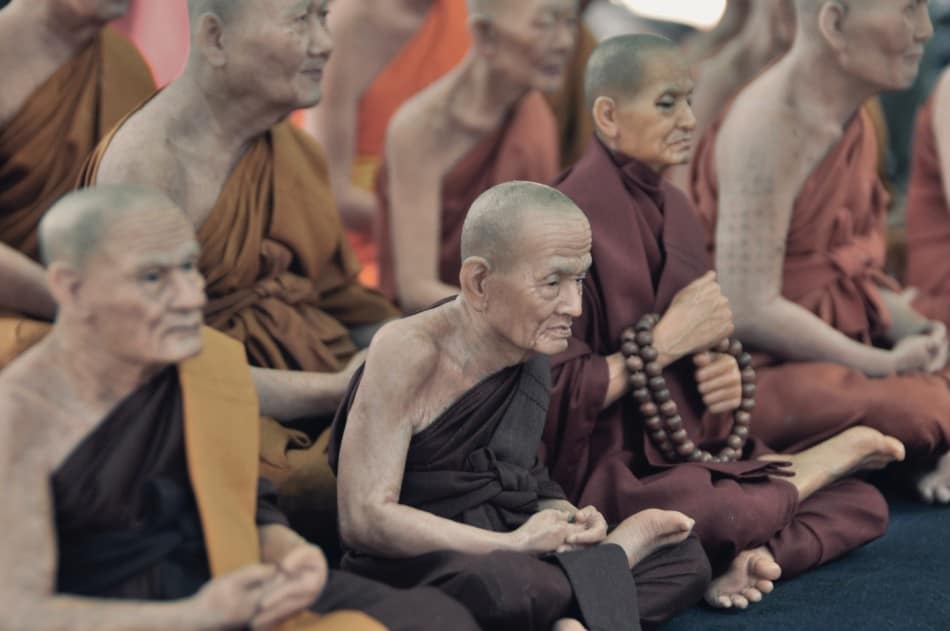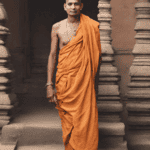Buddhism and Hindu religion share some customs and rituals but despite that there are also differences that distinguish the two religions, below are differences and similarities between the two religions:

Buddism Monks 
Priest Kids
Differences
- Hindu religion was not founded by any particular prophet while Buddhism was invented by the Buddha.
- Hindu religion believes in the efficacy and ultimate power in the Vedas while Buddhists don’t believe in Vedas or any Hindu scripture.
- Hindu religion accepts Buddha as an incarnation of Mahavishnu, this is regarded as one of the gods in Hindu religion, while Buddhists don’t accept any Hindu god in any of their religions or compared to their God, Buddha.
- Buddhists organize themselves in a monastic order commonly regarded as Sangha and their monks live in organized groups whereas Hindu religion lies in the concept of individualism.
- Buddhism doesn’t believe in the existence of God, whereas Hindus believe in the existence of Atman, the individual soul, and Brahman, the Supreme Creator.
- Both Hindu religion and Buddhism believe in Karma and rebirth, but they differ in the ways in which they operate and impact the existence of individual beings.
- In Buddhism, the refuge of Buddha, sangha, and Dhamma are the three cardinal requirements on the eightfold. While in the Hindu religion, people are offered many choices on path self-realization.
- Buddhism believes in the concept of Bodhisattvas, this practice is not done/allowed among the Hindu religion.
- Hindu religion has some gods and goddesses in their pantheon that Buddha people acknowledge but do not believe since it gives them a rather subordinate status.
Similarities

- Both Buddhism and Hinduism conduct the Tantra ritual, but both have different versions of their Tantra.
- Hinduism and Buddhism are common since both originated from the Indian soil. The founder of Buddhism was a Hindu, who is regarded as a Buddha. Buddhism is considered one of the greatest gift of India to mankind.
- Both religions share various spirituals practices and believe like; meditation, concentration, states of mind among many others.
- Both religions believe in karma, transmigration of souls, the cycle of births and also death for each soul.
- Both religions believe and emphasize the illusionary nature of the existence of the world. They also believe in the ultimate role of Karma in keeping men bound to the world and the cycle of births and deaths.
- Emphasis on compassion and no violence towards all living beings is highly regarded in both religions.
- The Advaita philosophy of the Hindu religion has related content to Buddhism in many aspects.
- Both the Hindu religion and Buddhism believe in detachment, renunciation of worldly life as a basic condition to entering the spiritual life. Desire is the main cause of suffering among the two religions.
- According to the Buddha, desire is the root cause of suffering and lack of desire results in the cessation of suffering. In Hindu religion, Upanishads, commonly known as Isa, and also the Bhagavadgita also consider actions as a result of desire and attachment leads to bondage and suffering, actions without desire bear the fruits of liberation.
- Both the Hindu religion and Buddhism believe in the existence of gods or deities on different planes or places of the world.
- Different from other religions, the Hindu religion and Buddhism believe in the existence of several hells and heavens, they believe in the existence of higher and lower worlds, aside from the world we are living in.
- Both Hindus and Muslims have some similar practices, like putting the palms over the face after Namaz, this is similar to Yoga.
